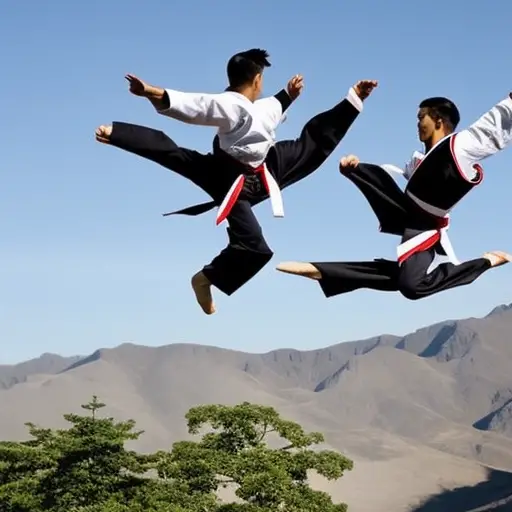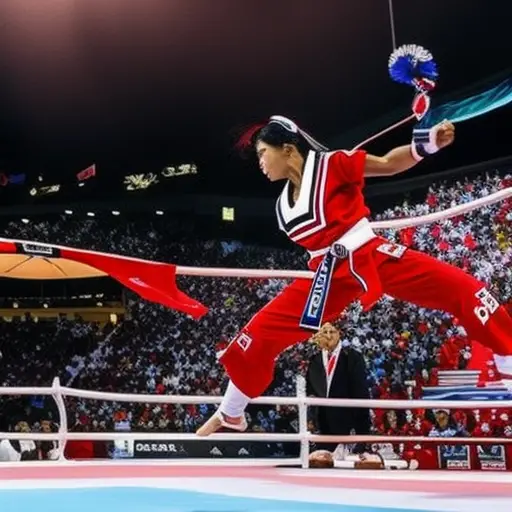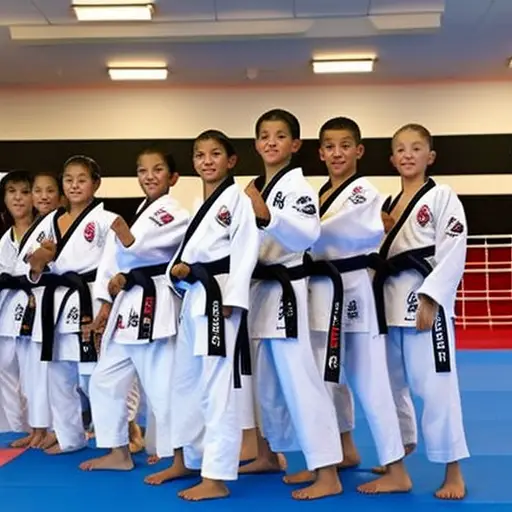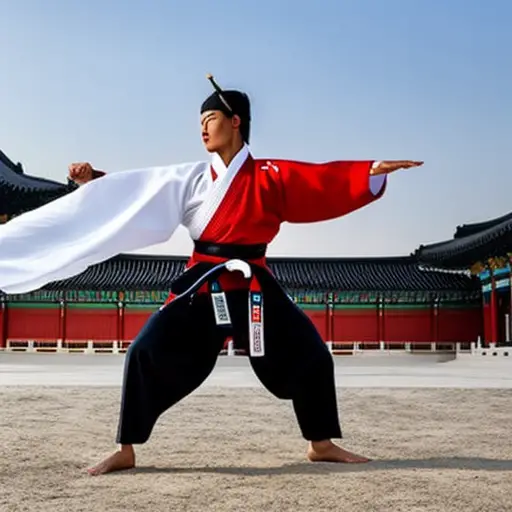How Taekwondo Promotes Unity and Brotherhood

Coincidentally blending physical prowess with mental discipline, Taekwondo emerges as a martial art that goes beyond mere combat techniques. It serves as a powerful force for fostering unity and brotherhood within its practitioners.
This article explores the various ways in which Taekwondo promotes these values, from the emphasis on respect and etiquette to the collaborative nature of training and the camaraderie forged in competitions.
Discover how Taekwondo’s influence extends beyond the realm of physical fitness, shaping individuals into a closely-knit community.
Taekwondo as a Community-Building Martial Art
Taekwondo’s emphasis on discipline and teamwork makes it an effective community-building martial art. Through its focus on these core values, Taekwondo provides a platform for social integration and cultural exchange. The practice of Taekwondo brings people from diverse backgrounds together, fostering unity and a sense of belonging within the community.
One of the ways Taekwondo promotes social integration is through its inclusive nature. Regardless of age, gender, or cultural background, individuals can participate in Taekwondo and engage with others who share a passion for the martial art. This creates opportunities for people to interact and form connections with individuals they may not have otherwise encountered in their daily lives.
Moreover, Taekwondo encourages cultural exchange by incorporating elements from Korean culture, the birthplace of the martial art. Practitioners learn about Korean traditions, etiquette, and language, which not only deepens their understanding of Taekwondo but also fosters a sense of appreciation and respect for different cultures. This cultural exchange enhances the overall experience of practicing Taekwondo and contributes to a more inclusive and diverse community.
The Role of Respect and Etiquette in Taekwondo
One important aspect of Taekwondo is the cultivation of respect and etiquette, as it plays a vital role in maintaining the discipline and integrity of the martial art. Respect and etiquette are deeply ingrained in the practice of Taekwondo and are considered fundamental values that all practitioners must adhere to.
In Taekwondo, respect is shown towards instructors, fellow practitioners, and even oneself. It is reflected in the bowing rituals performed before and after training sessions, competitions, or demonstrations. This gesture symbolizes humility, acknowledging the knowledge and experience of the instructor, and showing gratitude for the opportunity to learn and grow.
Etiquette in Taekwondo encompasses various aspects of behavior, such as punctuality, cleanliness, and proper attire. It also involves following instructions promptly and demonstrating self-control during training. These etiquettes promote discipline and help create a harmonious training environment where everyone can learn and progress together.
To emphasize the significance of respect and etiquette in Taekwondo, consider the following table:
| Role of Discipline | Taekwondo Values |
|---|---|
| Fosters self-control and focus | Integrity |
| Develops perseverance and dedication | Courtesy |
| Instills a sense of responsibility | Indomitable spirit |
Teamwork and Collaboration in Taekwondo Training
As practitioners engage in Taekwondo training, teamwork and collaboration are fostered through the shared commitment to learning and growing together. Taekwondo is not just an individual sport; it requires participants to work together in a group setting, which enhances group dynamics and promotes cooperative learning.
In Taekwondo classes, students often pair up or work in small groups to practice techniques, drills, and sparring. This allows them to learn from one another, exchange feedback, and support each other’s progress. Through this collaborative approach, practitioners develop a sense of camaraderie and unity within the training environment.
Teamwork and collaboration in Taekwondo training also extend beyond partner exercises. In group activities such as demonstrations or team patterns, participants must synchronize their movements and work harmoniously to achieve a cohesive performance. This requires effective communication, trust, and coordination among team members. By working together towards a common goal, practitioners learn valuable skills that can be applied both on and off the training mat.
The Bonding Power of Taekwondo Competitions
The camaraderie fostered through Taekwondo competitions strengthens the bond among practitioners and cultivates a sense of unity and mutual respect. Taekwondo competitions provide a platform for athletes to showcase their skills and compete against one another. However, these tournaments are not just about winning or losing; they are also about the spirit of fair play and sportsmanship.
In taekwondo competitions, athletes display a high level of sportsmanship and camaraderie. They cheer each other on, congratulate their opponents on a well-executed move, and offer words of encouragement. This sense of respect and support creates a positive atmosphere where everyone feels valued and appreciated.
The spirit of fair play is also deeply ingrained in taekwondo tournaments. Athletes are expected to compete with integrity and adhere to the rules and regulations of the sport. They compete against one another with a sense of fairness, knowing that the outcome of the match is determined by their skills and abilities, rather than any unfair advantages.
The bonding power of taekwondo competitions extends beyond the competition itself. Athletes form friendships and connections with fellow competitors from different schools and countries. These relationships transcend the boundaries of competition, fostering a sense of unity and brotherhood among practitioners.
Transition: Now that we have explored the bonding power of taekwondo competitions, let’s delve into taekwondo’s influence on personal growth and brotherhood.
Taekwondo’s Influence on Personal Growth and Brotherhood
Through its emphasis on discipline and self-improvement, as well as fostering a sense of camaraderie among practitioners, taekwondo serves as a catalyst for personal growth and the development of a strong brotherhood.
Taekwondo requires a high level of personal discipline, demanding practitioners to adhere to a strict code of conduct both inside and outside the training hall. This discipline translates into other areas of life, promoting self-control, perseverance, and a strong work ethic.
Improved Mental Fortitude: Taekwondo training pushes individuals to their physical and mental limits, teaching them to overcome obstacles and challenges with determination. This mental fortitude transfers into everyday life, allowing practitioners to face adversity head-on and maintain a positive mindset.
Enhanced Self-Confidence: As individuals progress in their taekwondo journey, they gain a sense of accomplishment and self-assurance. Through constant practice and improvement, practitioners develop a strong belief in their abilities, boosting their self-confidence and enabling them to tackle new challenges with ease.
Sense of Brotherhood: Taekwondo training fosters a strong sense of camaraderie among practitioners. The shared experiences, mutual support, and common goals create a tight-knit community that feels like a second family. This brotherhood provides a support system, encouraging individuals to push each other to reach their full potential and celebrate each other’s success.
Frequently Asked Questions
How Can Taekwondo Help Individuals Build a Sense of Community and Belonging?
Taekwondo fosters a sense of belonging and community building by providing a shared purpose and a supportive environment. Through training and teamwork, individuals develop bonds, mutual respect, and a feeling of inclusion, promoting unity and brotherhood within the taekwondo community.
What Are Some Key Principles of Respect and Etiquette That Are Emphasized in Taekwondo?
In taekwondo, key principles of respect and etiquette are emphasized through practices such as bowing and addressing instructors properly. Discipline and self-control are also emphasized, highlighting the importance of following rules and maintaining focus during training.
How Does Teamwork and Collaboration Play a Role in Taekwondo Training?
Teamwork and collaboration are fundamental aspects of Taekwondo training. Practitioners work together to achieve common goals, fostering a sense of unity and camaraderie. This enhances their overall performance and builds strong bonds within the Taekwondo community.
What Are Some Ways That Taekwondo Competitions Foster Unity and Bonding Among Participants?
Taekwondo competitions are instrumental in fostering unity and bonding among participants. They promote camaraderie, encourage mutual support, and develop team spirit. Through these events, relationships are strengthened, creating a sense of unity and brotherhood within the taekwondo community.
How Does Practicing Taekwondo Contribute to Personal Growth and the Development of Brotherhood Among Practitioners?
Practicing Taekwondo fosters personal growth and the development of camaraderie among practitioners. Through rigorous training and shared experiences, individuals gain discipline, confidence, and respect, forging strong bonds and a sense of unity within the Taekwondo community.
Conclusion
In conclusion, Taekwondo serves as a catalyst for promoting unity and brotherhood through its community-building nature, emphasis on respect and etiquette, teamwork and collaboration in training, and the bonding power of competitions.
It not only enhances personal growth but also fosters a sense of belonging and camaraderie among practitioners. Like a tightly woven tapestry, Taekwondo brings individuals together, forming a harmonious and supportive community where friendships are forged and lifelong connections are made.





